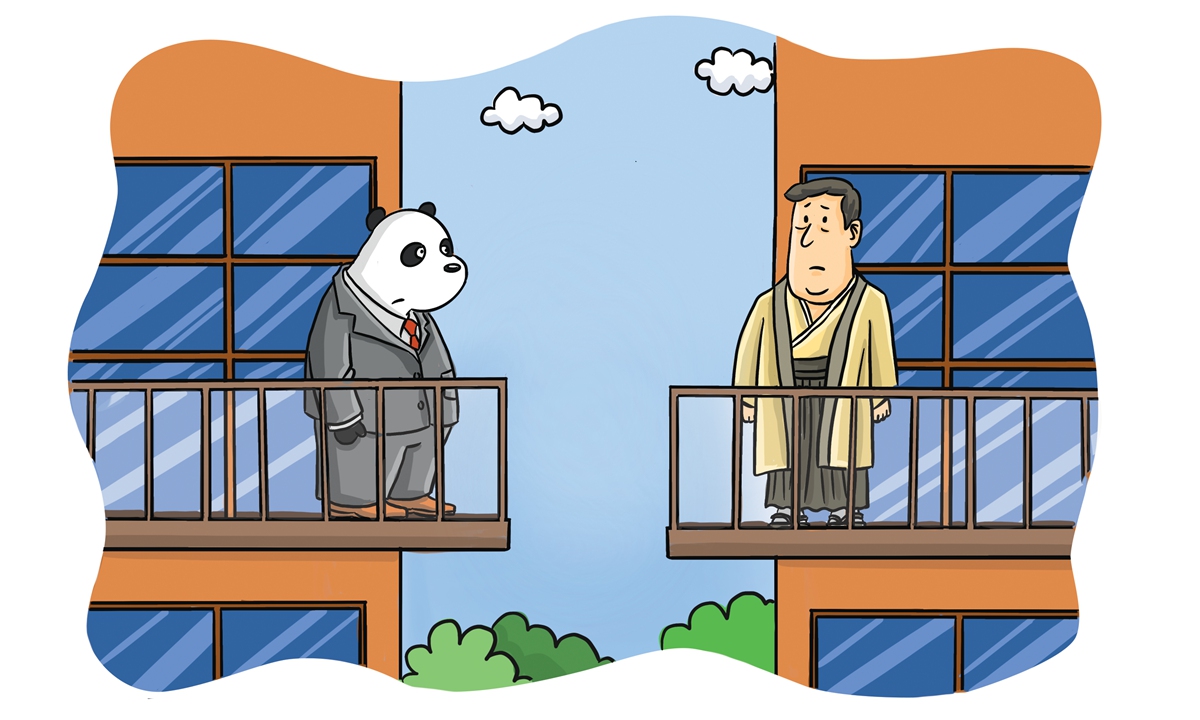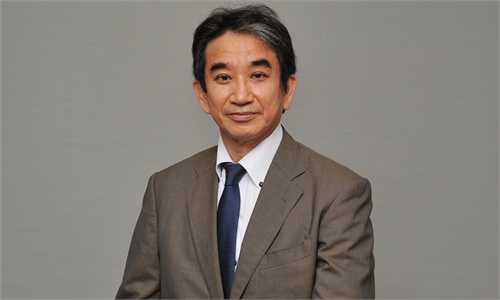
China, Japan Illustration: Xia Qing/GT
Editor's Note:
On January 1, 2021 Japanese director Ryo Takeuchi, who lives in East China's Nanjing, released his latest documentary China's Post-Pandemic Era. He is trying to explain why China has been able to put COVID-19 under control and achieved rapid economic recovery.
He bluntly noted, "I don't deny that there will be Japanese speculating that China's epidemic prevention achievements are fake. There are always people who don't understand China or believe in China."
Some surveys carried out in late 2020 showed different public opinions among Chinese and Japanese people toward each other. How do Chinese and Japanese view each other? Why was there such a big difference between the two people's perception? The Global Times interviewed Ryo Takeuchi and Da Zhigang, a Chinese scholar of Northeast Asian studies, to try to address these differences from the perspectives of their own peoples.
Ryo Takeuchi, Japanese director
Public opinion polls last year demonstrated sharp contrasts of how Chinese and Japanese people think about each other. In fact, such a difference in public opinion has always been the case. The Japanese people are more influenced by the Japanese media, especially TV programs. I used to work in Japan's media outlets, and I know very well that the audience measurement of contents that smear China on Japanese TV is significantly higher than that of other programs.
It is worth noting that the audience of such programs is of an older age group. Data shows that TV shows with contents that smears China were most popular among male viewers over 50-years of age. They lived through the 1990s "bubble economy" when they were young. Back then, it was the golden age of Japan, and they thought that Japan was the best and could not be surpassed by China. Their self-esteem will be hurt when they see reports saying that China is better than Japan in certain aspects.
Actually, young Japanese do not have such a bad impression of China. Young people in big cities, in particular, have diverse access to information and are very interested in China. For example, Japanese high school girls like to learn Chinese style makeup on short video apps of China, and high school boys love video games developed by Chinese gaming companies. They have no resistance to Chinese culture, but accept it naturally.
Japanese people in their 30s and 40s like China's high technology. For example, China's unmanned technology, which I introduced in my documentary released on January 1 entitled "China's Post-Pandemic Era: Winning Against All Odds," is very popular among the Japanese men in their 30s and 40s.
It is difficult to change the minds of older people. Ergo, producing more projects aimed at young and middle-aged groups is my direction for the next stage of film-making. Of course, as a Japanese director living in China, I will continue to introduce Japanese culture to the Chinese people and make a two-way effort to promote both Chinese and Japanese culture harmoniously.
The difference in public opinion between China and Japan is not about how they like or dislike each other, but the difference in the degree of interest to foreign countries. If you ask the average Japanese: "What do you think of China?" He or she would probably reply: "I have no idea. I'm not interested in other countries." But if there has to be a single answer, he or she would have to say: "I don't like China."
There are a lot of reports about foreign countries in China. Young people go abroad to study, ordinary people go abroad for travel and business trips, and they learn about the outside world in various ways. I think this is one of the reasons why the Chinese don't have such a bad impression about Japan today. When I was shooting for the documentary, Chinese people always answered my questions actively, telling me that they would never forget the history, but they could also accept Japanese animation and travel to Japan.
In Japan, the situation is completely different. People are not interested in international affairs and do not like to go abroad. They believe all the things reported about China on TV. The information resources and interests of the people in the two countries are completely different.
It is not as simple as whether they like or dislike each other.
Da Zhigang, director and research fellow of Institute of Northeast Asian Studies at Heilongjiang Provincial Academy of Social Sciences and chief expert at Northeast Asian Strategic Studies Institute
The Chinese people's feeling about Japan is associated with the political ties between the two countries.
Japan's attempt to "nationalize" the Diaoyu Islands in 2012 has set bilateral ties into low ebb, despite relations improving since 2014. Following this, Chinese President Xi Jinping and then Japanese prime minister Shinzo Abe met on several international occasions. Abe paid a visit to China in 2018. Both are strong supporters of the recently signed Regional Comprehensive Economic Partnership. These have injected positive energy to China-Japan ties.
During the early stage of the COVID-19 pandemic, China and Japan offered aid to each other, from the government to enterprises to the public. Japan has hoped that the Chinese leader could visit Japan. In November, Chinese Foreign Minister Wang Yi visited Japan and the two sides reached a wide range of consensuses on cooperation. All these are positive signs of China-Japan relations.
The Chinese people's understanding of Japan is based on a number of issues. Japan's attitude toward war, its amendment of history textbooks and its denial of the Nanjing massacre have left the Chinese people with a brutal and ruthless image of Japan. Japan's wrong moves on the issue of Diaoyu Islands and the East China Sea also amounted to dissatisfaction. The Chinese also believe Japan is in a submissive position in its alliance with the US. While the Chinese people criticize the Japanese' unwarranted worries about China, they admire Japan's specialized industries. Many Chinese young people are huge fans of Japanese animations.
In a word, the Chinese' perception toward Japan are comprehensive and rational and cannot be characterized simply as "good" or "bad."
During the latter stage of the pandemic situation last year, Japan followed the US closely by criticizing China over a number of issues regarding the island of Taiwan, Hong Kong and Xinjiang. This has something to do with Japan's understanding of China and its own international status. Since China surpassed Japan to become the world's second largest economy in 2010, the gap of strength between China and Japan has been enlarging. There has been a clear sense of loss among the Japanese people.
Japan used to hold the mind-set of "oceanic and industrial Japan" and "land and agricultural China." When such a mind-set faltered, worries and fear about China's rise began climbing. Japan viewed China with a superior mind and as an export destination only for its high-tech products. Meanwhile, Japan is the only developed country in Asia which has a liberal market economy and values system similar to the West. As Japan's sense of loss for its relative economic decline and its superiority for its state system and values system grow entangled, it presents the Chinese people with an image of an unsettling country. Perhaps when it gradually adapts to China's development, its sense of superiority will vanish. But this needs a long time.
Despite the historical feud between China and Japan, or Japan's sense of loss and superiority, Japan is a major country situated in East Asia - a friendly relationship between China and Japan matters to the two countries, the region, and the world. Given the deep economic and diplomatic relations between the two and relations between Japan and Western countries, there is plenty of room for China-Japan relations to go forward. A steady relationship with Japan fits China's long-term interests and diplomatic principles.
China will not adopt a superior mind because of its economic development and will learn from Japan's advantages. An objective understanding of Japan and maintaining a favorable relationship with it also benefits China's development.

